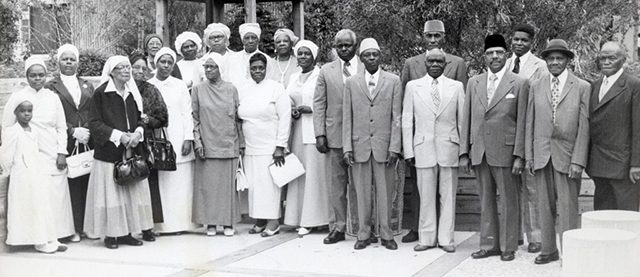
Oral History Interview with Malik Shabazz on October 17, 2020
Files
Loading...
Interviewee
Shabazz, Malik
Interviewer(s)
Walid, Zayd; Perkins, Dr. Alisa (Research Director)
Description
Oral history interview with Malik Shabazz conducted by Zayd Walid on October 17, 2020. Interview written by Dr. Alisa Perkins (Research Director) and Zayd Walid. Malik Shabazz was born and raised in Detroit, Michigan to parents who hailed from Mississippi and Illinois. Shabazz grew up in a close-knit African American community around Waverly Street, the neighborhood where the Muslim Center Mosque and Community Center is now located. He attended the neighborhood’s Longfellow Elementary School and graduated from Central High School. Shabazz was active in the Civil Rights Movement, marching on Washington in 1963 with Dr. Martin Luther King Jr. He joined the United States Navy in 1966 and served until 1968. Inspired by the teachings of Imam Warith Deen Mohammed, Shabazz reverted to Islam in 1975, and began attending Temple No. 1, which later became Historic Masjid Wali Muhammad. Shabazz is an advocate for patronizing black-owned businesses and a “do for self” philosophy. In 1985, he helped establish the Muslim Center Mosque and Community Center, taking a hands-on approach to its renovation. Throughout his life, Shabazz has contributed actively to Detroit’s Muslim community. He particularly advocates for outreach to young African American Muslims through mosque programming. In the interview, Shabazz reflects on his experiences growing up in Detroit in the 1960s and 1970s. He discusses his memories of the Civil Rights movement and elaborates on his experiences during the 1967 Detroit Rebellion. Shabazz expresses his hopes for the continued reinvigoration of Detroit’s African American Muslim institutions, particularly its mosques, schools, neighborhoods, and businesses.
Date of Interview
10-17-2020
Location of Interview
Detroit, MI (Muslim Center Mosque and Community Center)
Keywords
1963 March on Washington, 1967 Detroit Rebellion, African-American community, African American history, African-American Muslims, Imam Nadir Ahmad, Al-Ikhlas Training Academy, Muhammad Ali, Arabic language education, Arson, Black Christian Nationalists (BCN), Black Panther Party, Black-owned business, Central High School, Childhood games, Christianity, Civil Rights Movement, Rev. Albert B. Cleage Jr., Community building, Conversion to Islam, COVID-19 pandemic, Davison Freeway, Dawah, Detroit, Detroit Common Council, Devil's Night, Dexter Street, Do for self, Drug epidemic, Durfee Junior High School, East St. Louis, Economic decline, El-Hajj Malik El-Shabazz, Aretha Franklin, Rev. C. L. Franklin, Fruit of Islam (FOI), Great Society programs, Hajj, Halal food, Erma Henderson, Historic Masjid Wali Muhammad, Rev. Jim Holley, ‘I Have a Dream' speech, Illinois, Intergenerational relations, Islam, Islam in America, Islamic parochial school, Jewish-owned businesses, President Lyndon B. Johnson, Dr. Martin Luther King Jr., Linwood neighborhood, Linwood Street, Longfellow Elementary School, Malcom X, Masonic Temple, Michigan, Mississippi, Missouri, Imam Warith Deen Mohammed, Mosque, Mosque building, ‘Muhammad Speaks', The Honorable Elijah Muhammad, Municipal government, Muslim Americans, Muslim Center expansion, Muslim Center Jazz Cafe, Muslim Center Mosque and Community Center, Muslims, Nation of Islam, Neighborhood relations, Neighborhood revitalization, New Medinah Islamic Community, New York City, Newport, Oak Park, Police brutality, Adam Clayton Powell Jr., Qur'an, Racism, Ramadan fasting, Representing Islam, Reversion to Islam, Rhode Island, Riots, Rosa Parks Boulevard, Bobby Seale, Mitchell Shamsud-Din, Shrine of the Black Madonna, Sister Clara Muhammad Schools, Southfield, Sports, St. Louis, Sunni Islam, Temple No. 1, The Temptations, Senator Rashida Tlaib, Trans-Atlantic slave trade, U.S. Navy, United States Armed Forces, United States Congress, United States Senate, Waverly Street, Waynesboro, Wildemere Street, Women's role in Islam, Mayor Coleman Young, Youth outreach
Disciplines
African American Studies | Africana Studies | American Studies | Civic and Community Engagement | Digital Humanities | Inequality and Stratification | Islamic Studies | Nonprofit Administration and Management | Politics and Social Change | Race and Ethnicity | Religion | Urban Studies and Planning
Language
ENG
Document Type
Interview
Rights Statement
Dream of Detroit Interviews were made possible by funding from the Pillars Grant and Whiting Foundation. Content is for educational purposes only and non-reproducible; interviews are not to be duplicated, but may be linked through ScholarWorks with appropriate attribution. Please direct any questions about copyright to scholarworks@wmich.edu.
Funder
Pillars Fund and Whiting Foundation
Grant
Dream of Detroit
Length of Video
1:17:06
Recommended Citation
Dream Storytelling Project Team, "Oral History Interview with Malik Shabazz on October 17, 2020" (2020). Dream Storytelling Interviews. 17.
https://scholarworks.wmich.edu/dream-storytelling-interviews/17




Notes
Interview conducted by Zayd Walid at the Muslim Center Mosque and Community Center. Interview written by Dr. Alisa Perkins (Research Director) and Zayd Walid. Interview recorded under the direction of Supervising Producer Malikah Shabazz. Videography by Abdul-Zahir Sadid. Video Edited by: Mandy Weiss. Transcribed by: Taylor Woods and Dr. Alisa Perkins. Transcription edited by: Dr. Alisa Perkins. Metadata prepared by: Hannah Cole. Metadata edited by: Dr. Alisa Perkins and Sophia Wimberley.